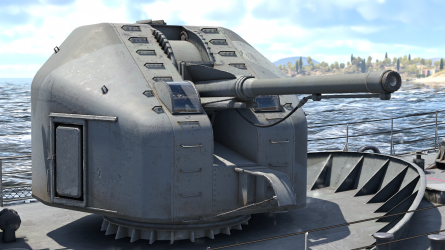100 mm/55 MLE model 53 (100 mm)
Contents
Description
Write an introduction to the article in 2-3 small paragraphs. Briefly tell us about the history of the development and combat using the weaponry and also about its features. Compile a list of air, ground, or naval vehicles that feature this weapon system in the game.
Vehicles equipped with this weapon
General info
Tell us about the tactical and technical characteristics of the cannon or machine gun.
Available ammunition
Describe the shells that are available for the weapon and their features and purpose. If it concerns autocannons or machine guns, write about different ammo belts and what is inside (which types of shells).
Comparison with analogues
Give a comparative description of cannons/machine guns that have firepower equal to this weapon.
Usage in battles
Describe the cannon/machine gun in the game - its distinctive features, tactics of usage against notable opponents. Please don't write a "guide" - do not impose a single point of view, but give the reader food for thought.
Pros and cons
Summarise and briefly evaluate the weaponry in terms of its characteristics and combat effectiveness. Mark pros and cons as a list.
Pros:
Cons:
History
The 100 mm/55 MLE 53 is a French naval cannon developed in 1953. As France found their interwar and World War II era arsenal of naval guns was obsolete when the war ended, they began developing a new multi-role weapon. The result became the MLE 53, a 100 mm cannon that replaced the 57 mm and 127 mm cannons in service and optimized to serve as an anti-ship, anti-aircraft, and shore bombardment weapon. The MLE 53 version of the design is an automatic weapon, but the first round is manually loaded with the remaining rounds loaded from the recoil operation. Alongside France, the guns were used by Argentina, Belgium, China, Portugal, Turkey, Brazil, Saudi-Arabia, and Germany.
Germany mounted the MLE 53 on two class of ships. These ships were the Köln-class frigates, such as the Köln and Lübeck, and the Hamburg-class destroyers. Both classes have been retired, but the MLE 53 and its variants remain in service with France and other nations around the world.
Media
Excellent additions to the article would be video guides, screenshots from the game, and photos.
See also
Links to the articles on the War Thunder Wiki that you think will be useful for the reader, for example:
- reference to the article about the variant of the cannon/machine gun;
- references to approximate analogues by other nations and research trees.
External links
| Germany naval cannons | |
|---|---|
| 15 mm | MG 151 |
| 20 mm | 2 cm/65 C/30 · 2 cm/65 C/38 · 2 cm/65 Flakzwilling 38 · 2 cm/65 Flakvierling 38 · MG 151/20 |
| 30 mm | MK103/38 |
| 37 mm | FlaK-Lafette C/36 · 3.7 cm FlaK-Lafette LM/42 · SK C/30 · FlaK.36 · FlaK43 |
| 40 mm | 40 mm/70 MEL58 · Bofors Flak 28 · Bofors L/70 model 1948 |
| 52 mm | 52 mm/55 SK L/55 |
| 88 mm | 8.8 cm/76 SK C/32 · S.K.C/35 · FlaK.18 · Flak.36 · 88 mm/45 AA SK L/45 · 88 mm/45 casemate SK L/45 |
| 100 mm | 100 mm/55 MLE model 53 |
| 105 mm | SK C/32 · SK C/33 AA |
| 120 mm | L45 |
| 128 mm | 12.8 cm/45 SK C/34 |
| 150 mm | 150 mm/45 SK L/45 · 15 cm/48 KC/36 · 15 cm/55 SK C/28 · 15 cm/60 SK C/25 |
| 203 mm | 20.3 cm/60 SK C/34 |
| 283 mm | 283 mm/45 SK L/45 · 283 mm/52 SK C/28 · 283 mm/54,5 SK C/34 |
| 305 mm | 305 mm/50 SK L/50 |
| 380 mm | 38 cm SK L/45 |
| Foreign: | |
| 23 mm | ZU-23 (USSR) |
| 25 mm | 2M-3 (USSR) |
| 30 mm | AK-230 (USSR) |
| 37 mm | V-11 (USSR) |
| 76 mm | 76 mm/62 OTO-Melara Compact (Italy) |
| 100 mm | 100 mm/56 B-34 (USSR) |




